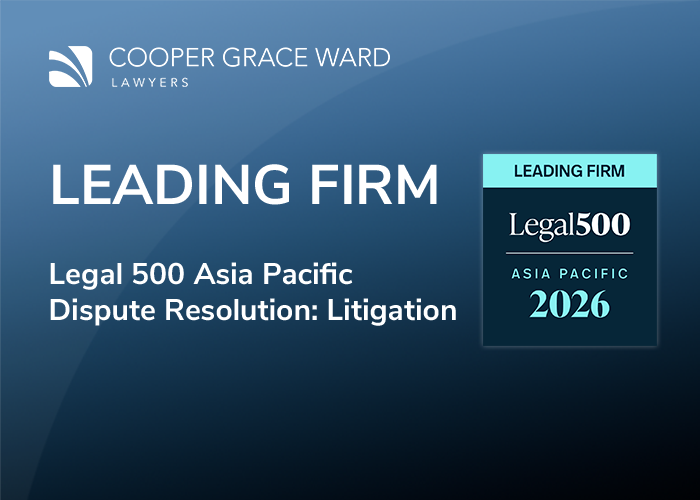In this week’s video, family law partner Justine Woods discusses what to do and what not to do when it comes to family loans.
Video transcript
Hello, hello, everyone. I’m Justine Woods. I’m the family law partner at Cooper Grace Ward and today I thought I would discuss family loans and what to do and what not to do.
Case of Dawson and Dawson No.2
And the case of Dawson and Dawson No .2. As I always say, very grim sign if you’ve got a number following the name of your family law case because it means perpetual litigation. Now, I just see this all the time. Not only do I act for the spouses, I often act for the parents of one spouse of varying degrees of wealth, sometimes immense. And it’s a common theme whether people are advancing $50,000 or $5 million, for example. So here, it seems to me absolutely everyone in this case, including the judge, is trying to have it every way. So, in this case, the wife’s parents during their long marriage, advanced $1.95 million to the parties. They were described as interest free loans, repayable on demand, but a fairly informal sort of loan agreement and not a cent repaid. Then, towards the end of the marriage, they were given another $ 500,000 by the wife’s parents, and that was intended to be an educational fund for their children. Following separation, what do you know, and I see this all the time, the parents issue the letter of demand and the wife, within a matter of days repays her parents $450,000 of the alleged loan. Now as time goes by, they keep fighting, there’s the No. 1 case, whatever. Post separation, the parents lent the wife another $360,000, not all in one lump sum, but over a period of time. Now, the husband said, ‘these aren’t loans, these are all gifts’. Now, this is the central problem.
Is money a gift?
If it’s a gift, it stays in the pool and unless there are very unusual factual circumstances, the gift is regarded as a contribution only by the spouse who’s related to the person who advanced the money. For example, wife’s parents, here we’ve given you $1.95 million, plus another $500,000, plus $500,000. That would all be a contribution by the wife. It increases her contribution percentage. But it’s not repayable. It’s not quarantined. It’s not refunded. A loan, of course, natural meaning of a loan is repayable from the schedule of assets and is, for example, if secured would be repaid as an actual loan, as if it were advanced by a bank, for example. So, the court said, ‘a gift is a gratuitous transfer of property or money without obligation’. And this is why I say the judge has it every way too, because the judge said, well that’s not a gift, that clearly there is some obligation here. And even remarked that there was no card of thank you. It was it was clearly money advanced, acknowledged to be a loan. So, there was there was no suggestion of impropriety or we don’t believe you or whatever. The judge says ‘yes, these are all loans’. But because there hadn’t been any repayments, because the whole amount hadn’t been repaid, post separation, further sums were advanced, the judge drew the conclusion that if the parties hadn’t separated, the parents would never have demanded the repayment and therefore, while acknowledging that they were legitimate loans, found that they would not have been expected to repay them. And so they were not included in the balance sheet.
Loans must be documented
Now, I have discussions all the time with my own clients, or sometimes with, if I’m acting for the parents, if it’s going to be a loan, it must be a genuine loan. It must be documented. Both parties must sign the loan agreement. Both parties should have independent legal advice. If it’s significant enough, it should be secured on the title. If it’s buying a property, for example, it must go on the title. Now, there should be repayments. Look, there have been some loans held by the Family Court to be repayable when there hadn’t been. It was just repayable on demand or for example, on the sale of a property. Yes, that absolutely is possible. But the highest level of protection is if you’re going to say it’s a loan, then treat it as loan, and there have to be repayments. Now that’s not necessarily a guarantee. I couldn’t find a case where regular repayments had been made and the court said ‘we’re no longer going to treat it as a loan’, but the court really has immensely broad powers so they can say that. But I think this illustrates, you can’t say it’s a gift and nobody has to repay it or treat it as a gift. But then the minute your son or daughter’s spouse separates, then say, right, that’s a loan, it’s all coming back. You really have to choose an outcome and this is so vital. So, the very wealthy clients I act for, well, everyone’s you know, maybe there is the idea that it’s not actually repayable or if it’s repayable, it will just be advanced again. But I mean, I have friends who are in the Supreme Court. There are plenty of matters there where sometimes the marriage is still intact, but the old parents are trying to get back money that they did loan. And some of it has been repaid and the other side, both husband and wife say, ‘oh no, that was all a gift’. So, the more important it is for repayment, it’s absolutely vital for third parties to protect their own interests and for spouses to realise that you can’t have it one way during the marriage and then post separation with any degree of ease say ‘no actually, it’s the other way’. And there’s a massive generational transfer of wealth in process now and coming our way. So, these are more and more important issues and central to many people’s family and business lives.
So, if you’d like to talk about that or any other issue in relation to a family law matter, you’re very welcome to contact us here at Cooper Grace Ward.





